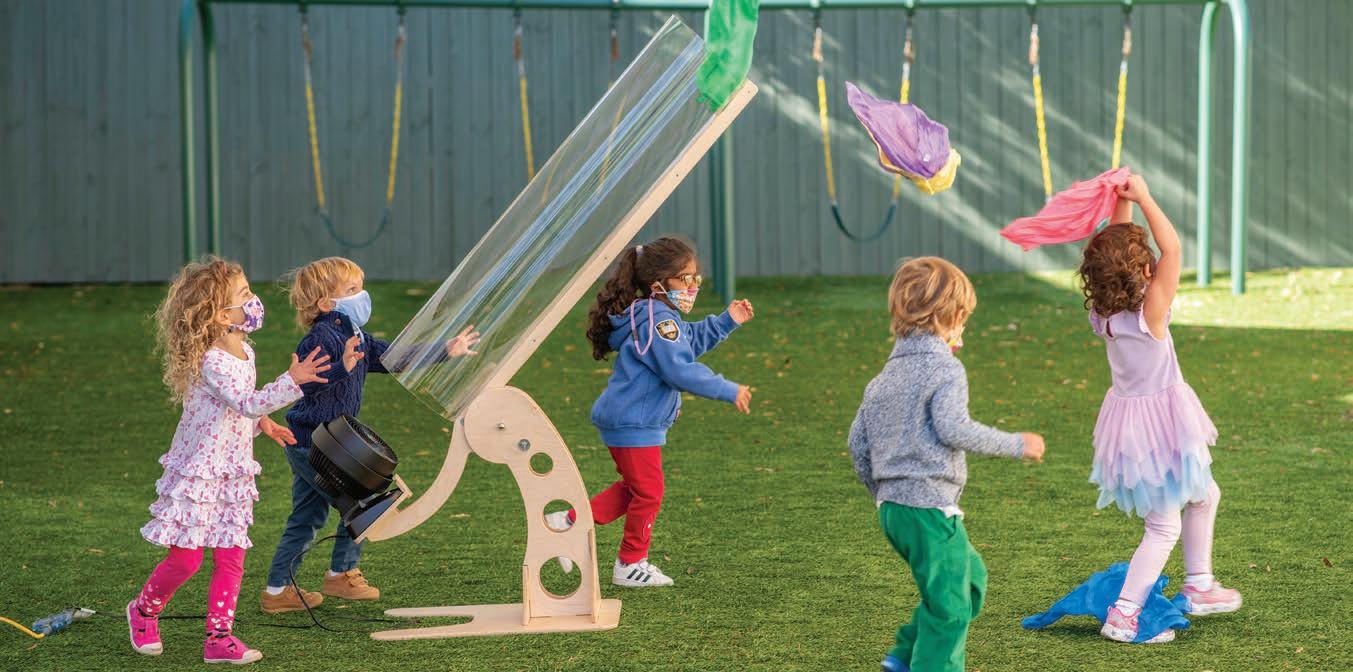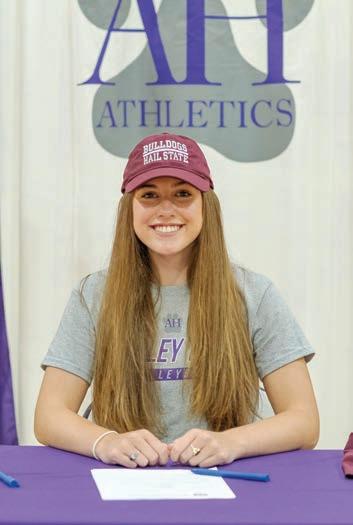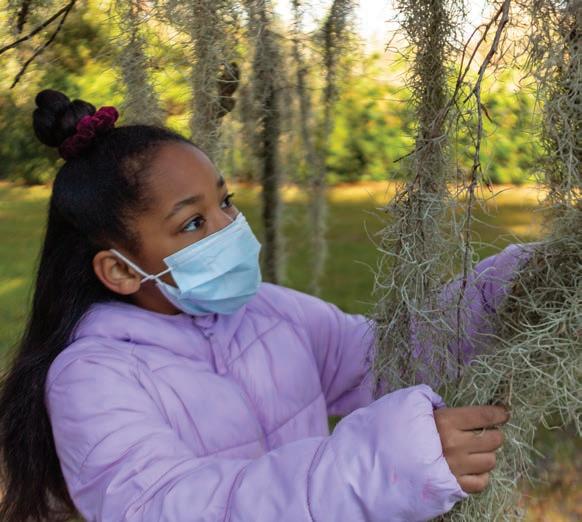
1 minute read
The Power of Expression: Laying a Foundation for Civil Discourse
COLLABORATIVE Compassionate DISCERNING INTELLIGENT PURPOSEFUL WORLDLYCreative THE POWER OF EXPRESSION: Laying a Foundation for Civil Discourse By Jennifer Turner, Editor & Director of Content
As an educational institution that values open discussion, meaningful engagement, and mutual respect, Ashley Hall prioritizes equipping students with the tools and experiences they need to participate in civil discourse. Beginning in the Lower School through the application of Ashley Hall’s Hallmarks, this foundation builds with the School’s spiral curriculum to culminate in graduates who confidently speak for themselves as well as openly listen to others.
“Civil discourse is the practice of engaging in conversation for the purpose of seeking and fostering understanding. It involves the commitment of all parties to a respect for truth, a practice of active listening and purposeful speaking, and an understanding that the cultivation of civil discourse is not a right but a responsibility.” —Ashley Hall’s Statement on Civil Discourse
In October, Ashley Hall released its Statement on Civil Discourse, a document that encapsulates the School’s long-established approach to productive and meaningful discussion. “The result of a collaborative effort between faculty and administrators to articulate how we embrace honesty, responsibility, and integrity as the guiding standards for daily interaction, this document represents our continued commitment to nurturing and modeling a culture of civil discourse as integral to campus life,” said Head of School Jill Muti. Founded on Ashley Hall’s Hallmarks— Compassionate, Intelligent, Worldly, Creative, Collaborative, Purposeful, and Discerning—the Statement on Civil Discourse serves as a blueprint for helping students articulate their perceptions as well as grow in their interactions with others.
LOWER SCHOOL FOUNDATIONS
“Ashley Hall is committed to teaching students the social, emotional, and intellectual skills needed to sustain civil discourse.” —Ashley Hall’s Statement on Civil Discourse
Lower School students begin learning the foundation for meaningful expression and interaction that eventually will support their ability to engage in civil discourse. “Socialemotional learning is in everything the girls do—how they have Responsive Classroom greetings at the start of the day, how they do their morning meetings, how they come up with the class rules, and how their teachers model civil discourse and mediate conflicts,” said Lower School Counselor Jennifer Vaughan. “It is in the way our PE coaches encourage sportsmanship, the books chosen for literature, the emphasis made in history classes, and
the very selection of courses offered. Most importantly, it is in how we treat our students and each other and what we encourage in our classes.” This all-encompassing approach creates an environment where civility is integral to each student’s day. “Responsive Classroom is the curriculum that we use in Lower School to teach social and emotional skills,” noted Lower School Director Polly Kronsberg. “We teach the girls how to actively listen to one another, how to have empathy for others, and how to show compassion. All of these skills relate to civil discourse: how we engage one another in a thoughtful and purposeful way.” discussion on behaviors that promote our Hallmarks,” said Intermediate Program faculty member Katie Pérez-Phillips ’07. “This initiative was student-led and based on a Yale-designed program that facilitates discussions on expressing emotions and group expectations around behaviors.” Featuring words of affirmation and positivity, the charters record students’ efforts to both understand and apply each Hallmark’s meaning. “The charters are a way to inspire,” asserted Intermediate Program faculty member Kiki Sweigart. “They create an environment
| Head of School Jill Muti addresses seniors during the launch of Ashley Hall’s Statement on Civil Discourse. Photo by Meredith Frazier
that incorporates students’ core values and spirit of community.” Intermediate Program students also become more directly engaged with the ideals of civil discourse and begin offering their own contributions to the dialogue process. “In October, all fifth and sixth grade English classes discussed the Statement on Civil Discourse and sent their input to Upper School students who are working to develop a statement incorporating student perspectives,” noted Intermediate Program Coordinator Mary Schweers. “We talked about the connection to the Hallmarks, kindness, willingness to listen thoughtfully (even if you disagree), and inclusivity.” In addition to leading class discussions, students shared their thoughts on civil discourse in action through reflective essays.
Through their Wellness curriculum, students learn socialemotional skills tied to the Hallmarks, which help with realworld applications. “Starting in kindergarten and continuing onward, the girls learn strategies to regulate and manage strong emotions,” Vaughan said. “They are taught that they are responsible for themselves, including their behavior, actions, UPPER SCHOOL APPLICATIONS “Students can navigate complex, nuanced, emotionallydriven conversations only by establishing a firm basis of trust built on the commitment of community members to the School’s Hallmarks.” —Ashley Hall’s Statement on Civil Discourse and speech. They are encouraged to think before they speak, to filter their thoughts, to consider other points of view, and to learn the term ‘empathy’ and practice it in role plays.” Relationship building is also a vital aspect to each girl’s development. “Socialemotional learning occurs when we model how to handle when we invariably make mistakes and how we try to repair the relationship,” Vaughan continued. “Civil discourse is more effectively learned in relationships, and the relationship between teacher and student and how students see the adults in their lives treat one another are absolutely key.” Building upon the Lower School’s social-emotional learning anchored by the Hallmarks, the Upper School prioritizes opportunities for students to apply their knowledge and actively participate in civil discourse. “Our girls get good practice at handling thoughtful discussion and respectful listening in all of our classrooms,” said Anne Weston, Ph.D., ’73, the Assistant Head of School and Upper School Director. “Our Statement on Civil Discourse gives us a chance to state our community beliefs, expectations, and norms in a more formal way, and our girls will have a chance to translate this into their school environment, As part of the Lower School, the Intermediate Program takes part in its comprehensive Wellness programming and continues reflecting on what they need and want to feel supported and valued as they express themselves.” to emphasize the Hallmarks and their applicability to everyday life. For example, at the beginning of this school year, each Advisory group collaborated on the creation of its own charter. “The charters have been a wonderful way to continue the During a special Assembly attended in person by seniors and watched virtually by the rest of the Upper School, Head of School Jill Muti shared why civil discourse is so vital to a community. “Freedom of thought and expression, especially in an educational offer a guiding framework for conceptualizing the value of civil discourse within our community. —Ashley Hall’s Statement on Civil Discourse ” 47
institution like Ashley Hall, is essential to allowing us to be curious and explore what we do not understand,” she asserted. “However, we must all recognize that along with this independence comes responsibility, not only to oneself but also to those with whom we live in community. Because our School embodies a rich tapestry of many different perspectives and viewpoints, we must affirm a shared set of values for campus dialogue to guide us in how we engage with each other in productive ways.”
To deepen their understanding of the universal tenets of civility found within the Statement on Civil Discourse, students worked within their English classes to analyze the document and collaborate on composing their own rules for class discussions that encourage civil interactions. “Creating the class contracts forced students to reflect on effective and ineffective discussions and what they need to do as well as how they need to act in order to have effective, engaging, and civil discussions on difficult topics,” noted Upper School faculty member Leslie Rowland-Yeh, who coordinated the classroom activities for the English Department. “Preparing them in-depth also allayed fears and anxiety about such discussions. Clarifying that we would discuss—not debate or persuade—was an important distinction.” An Upper School student committee advised by Rowland-Yeh will review the submissions from each class to ultimately create a comprehensive school contract.
AN ONGOING MISSION
“We recognize that we may not always reach agreement with others but that we can still demonstrate awareness, reflection, empathy, and respect and seek to understand the feelings and perspectives of others.” —Ashley Hall’s Statement on Civil Discourse
In striving to fulfill its mission to produce educated women who are independent, ethically responsible, and prepared to meet the challenges of society with confidence, Ashley Hall is committed to fostering a learning environment built upon a foundation of respect, openness, and civility. “At Ashley Hall, you are given a multitude of opportunities to use your voice not only to express yourself but also to support others in doing the same,” Muti told students. “We are fortunate to be a community that strives to make civil discourse woven into the fabric of our School by practicing it on a daily basis.” The value of that commitment is a foundation worth building upon.
To read Ashley Hall’s Statement on Civil Discourse, please visit ashleyhall.org/StatementonCivilDiscourse
2025
AROUND THE SHELL HOUSE STORIES THAT CAPTURE THE PULSE OF CAMPUS
By Jennifer Turner, Editor & Director of Content
THE POWER OF
PLAYPLAY
In the Early Education Center (EEC), play is paramount to love exploring the cause and effect relationship of placing learning, and students now have several new ways to pique their different objects inside of the tunnel to see the exciting results!” curiosity and captivate their attention. “Because of our Reggio- All kinds of appropriate objects have safely been launched and inspired curriculum, we strongly believe that our students inspired numerous investigations in the classroom. learn best through hands-on, experiential learning,” said EEC Director Betsy Quirin. “We recognize the importance of With the addition of light laboratories for each EEC grade level, creating a relationship-driven atmosphere where our students students are gaining a new understanding of color and delighting in can connect with each other, materials in the classroom, and their own color mixing explorations. “The children are fascinated their environment.” with experimenting with not just color mixing but also object Thanks to the efforts of a generous donor, two new STEAM- how this hands-on, exploratory tool allows our students to focused centers debuted in the fall, to the thrill of students and transform and create.” teachers alike. First encountering the EEC’s new wind tunnel, Jack Bischoff ’36 exclaimed to his teacher, “This is amazing, Key in fostering experiential play, the wind tunnel and light Mrs. Carter!” and his classmates enthusiastically agreed. laboratories offer students hours of enrichment and learning. “The wind tunnel is a truly unique experience where our Just as important, these centers are sparking new ways for students can explore the movement and pressure of air, object young minds to comprehend the scientific and creative weight, and force,” noted Quirin. “It can transition to different underpinnings of life. angles to allow for even more experimentation, and the children translucency and manipulation,” Quirin pointed out. “We love

PANTHER PRIDE!

In November, Laughlin Murray ’21 took part in National Signing Day by declaring her intent to play volleyball at Mississippi State University in the fall. A talented athlete who in 2020 was placed on Under Armour’s All-American Watch List, Murray was selected for the High School All-Region Team by the American Volleyball Coaches Association, an honor reserved for the top performing volleyball athletes in the country. She was one of only 26 student-athletes chosen nationally to receive the Junior Volleyball Association’s 2020 Athleader award and was named to the South Whether on the court, in the pool, or down the fairway, the 200 student athletes who proudly represented Ashley Hall this fall inspired everyone with their work ethic, teamwork, and commitment to their sports during a season that presented challenges like no other. A special PQV to the varsity tennis team for their third-in-a-row state championship win and the crosscountry team for winning their state championship as well.

NATIONAL Signing Day
#GoGirlGo Carolina Independent School Association (SCISA) 3A 2019 All-State, All-Region, and All-Star teams. As a sophomore, she played a vital role in leading the Panthers to victory over Porter-Gaud in the 2018 state championship game. On Senior Night in October, she made her 2000th career assist—an unforgettable and record-setting moment within Ashley Hall’s historic athletic program. From beginning her Ashley Hall journey as a kindergartner to now finishing strong as a senior, Murray defines what it means to be an Ashley Hall girl!

Boat Building has become a rite of passage for Ashley Hall fifth graders, who partner with the Lowcountry Maritime Society on a year-long project to craft their own fleet of wooden boats, and the tradition continues this year! While the safety precautions have increased, the opportunities for skill building, confidence gains, and outdoor fun make this the perfect project for immersing students in experiential education.
Research shows that girls decide as early as fifth grade if they will consider careers in the areas of math and science. For the Intermediate Program, sparking interest and solidifying skills in STEAM fields are key curricular goals. “I like Boat Building because it teaches me new skills like drilling, driving, and measuring parts of the boat,” said Marlowe Johnsen ’28. “It gives us new ways to learn.” Creating an outlet for girls to gain confidence and enjoy working outdoors is also a priority. “I love it because everyone is working together, we get to try new things, and we are making new friends while we do it,” asserted Brier Fava ’28. “Yes, we do use power tools a lot!”

During this unique STEAM project, students are guided through the process of learning how to read scaled plans and then to transform those plans into a wooden boat they build themselves. In addition to teaching building craftsmanship, the program places an emphasis on communication and teamwork. “I love Boat Building because you get to work together and make a really cool project in the end,” said Hannah King ’28. That finale comes this spring, when the girls will launch their boats in water to evaluate their handiwork. With all their hard work and determination, there should be smooth sailing ahead.

| From top, L-R: Georgia Newman and Wells Phillips, Class of 2028, drill holes as they build their boat | Fifth graders work together to frame a boat hull. Photos by IP faculty member Olivia Hipp ’10 | Opposite, from top: The varsity cross country team and the varsity tennis team. Photos courtesy Ashley Hall Athletics Department | Laughlin Murray ’21. Photo by Meredith Frazier


THE RETURN OF

Lower School students were thrilled to visit Ashley Hall’s Johns Island property in the fall for fresh air and experiential learning fun. The science-focused excursions allowed students to enjoy short day trips while carefully adhering to all health safety precautions. From first grade’s nature explorations to fourth grade’s teaming up with the Department of Natural Resources to learn about ways to reduce their carbon footprint, the invigorating woodland trails were the perfect way to get back to nature.
Summer is meant for exploration, enrichment, and doing what one loves best, and Ashley Hall looks forward to welcoming campers back to campus for innovative and fun summer programming. Visit ashleyhall.org/summerprograms to view the complete schedule and register. Give your child a summer to remember!
As Halloween was creeping up, so was an old Ashley Hall friend: Georgie the Ghost! In October, first graders slowly climbed the McBee House spiral staircase and gathered around Head of School Jill Muti in the McBee drawing room to hear her read the story of Georgie and how she came to live in the attic of McBee House. Brimming with questions, the girls wanted to know what Georgie liked best about the School and if she enjoyed watching students from her attic window. Afterward, the girls walked on tiptoe upstairs to find an apology note from Georgie, who was too shy to come out but left a generous gift of candy. Each year, first graders excitedly anticipate this special Ashley Hall tradition.
STRONGER TOGETHER

In classes throughout the Early Education Center (EEC), tiny feet twitch and eager eyes watch with anticipation for a very special moment: the revealing of the week’s mystery reader! This year, parents were invited to record themselves reading a favorite book to share with their child’s class. The resulting videos have become a main attraction and a meaningful way for families to become involved. “We have a different mystery reader each week,” said EEC faculty member Rachael Carter. “The children light up when they see their parent or a friend’s parent. It’s been a phenomenal way to build connections between home and school.” Part of the fun is the guessing game of who will virtually appear in the classroom. Parents enjoy choosing books As an advocate for women helping women, Elliot Tick ’24 is passionate about improving the lives of others. After learning about the Homeless Period Project, a non-profit that creates awareness and delivers hygiene products to those in need, she immediately wanted to become involved. “Menstrual products are just as important as Band-Aids or other medical supplies and should be available to those who need them,” she asserted. “Medical needs should not be bad enough to distract girls from their education.” Feeling strongly about the issue, Tick applied for and won the first Amanda’s Leadership in Service Grant, a special Ashley Hall award designated to support a ninth through twelfth grade student’s community service project. “As an all girls’ school, it should be our that fit with a special class investigation or help celebrate a holiday. Attention to detail is key; dressing the part for Halloween, parent Laura Barnhart read Room On the Broom to her son William’s ’36 pre-primary class. Hearing a familiar voice is deeply reassuring to children, as is continuing the EEC tradition of parents taking the time out of their day to read a special book to the class. For Ashley Hall faculty members, it is one more way to reinforce the vital partnership between home and school. “The children’s surprise is always the best!” enthused EEC Director Betsy Quirin. “They have been loving it!” With such a supportive learning environment, the reason for their excitement is certainly no mystery. mission not just to empower each other but to empower other women in our community,” she noted. “We have the ability to do so many good things, so why don’t we? My goal is to give enough products to one school to last them a year.” In November, she made significant progress toward that goal during her first supply drive to collect packs of hygiene products. In addition to holding supply drives and fundraisers, Tick wants to use the project as a way to help eradicate any negative connotations associated with the natural processes of a woman’s body. “One of our most powerful tools is to educate, and we can set off a ripple effect by educating people that will go far beyond us,” she said. “This is one thing
WHO WILL THE READER BE? It’s a Mystery!
that brings together women, so let’s do it.”

| From top: Elliot Tick ’24. Photo by Meredith Frazier | Pre-kindergarten students eagerly watch the big reveal of the mystery reader for the week. Photo by EEC faculty member Katie Harvard | Opposite, from top: Gabby Hobal ’30 examines Spanish moss. Photo by Betsy Sidebottom | Campers enjoy painting outdoors during Ashley Hall’s Summer Programs. Photo by Kelly Grace Photography | Head of School Jill Muti reads to first graders. Photo by Meredith Frazier
Ashley Hall Writers Series presents AN EVENING WITH AMRITA CHAKRABARTI MYERS, PH.D.
February 3, 2021 | 7:00 p.m. - 8:00 p.m. This event will be offered as a digital presentation. Open to the public and free of charge. Registration required.
Ashley Hall, in partnership with College of Charleston’s Avery Research Center, is pleased to present noted scholar Amrita Chakrabarti Myers, Ph.D. who will discuss her book Forging Freedom: Black Women and the Pursuit of Liberty in Antebellum Charleston during an interview with American history scholar and Upper School faculty member Chris Frisby. A Question and Answer session will follow. Dr. Myers is the Ruth N. Halls Associate Professor of History and Gender Studies at Indiana University. As a historian of the Black female experience in the United States, her research interests revolve around issues of race, gender, freedom, and power and the ways in which these constructs intersect with one another in the lives of Black women in the Old South. To register for this event, please visit
ashleyhall.org/WritersSeries

Congratulations to Natalie Smith ’18, whose Rhodes College research project, focusing on redistricting cases in the American federal judiciary, garnered her a prestigious fellowship to delve deeper into her work. The project included coding 630 federal redistricting cases that occurred between the years 1910 and 2019 and analyzing the resulting data.

“Once I learned about the redistricting process and its implications in the American context, the redrawing of electoral lines fascinated me because it involves issues of racial equality, identity politics, proportional representation, partisan power, population equivalence, and voting rights,” said Smith, who plans to submit her article “The Debureaucratization of the Federal Judiciary in Redistricting Case Law” to an academic journal. “It is a complex and salient issue with political implications that affect every person living in the United States.”
After completing her undergraduate work, Smith plans to pursue a Ph.D. program in political science with a concentration in public policy, public administration, and bureaucratic theory. “I am really excited about this because I hope to be a professor in higher education,” she enthused. “Ashley Hall is where I first began to discover that teaching was something that I wanted to pursue, mainly because I loved my Ashley Hall experience and wanted to be just like Madame Decker, Mrs. Newton, and Mrs. Ciany.”

Ashley Hall’s Task Force on Diversity, Equity, and Inclusion
With the goal of advancing diversity, equity, and inclusion (DEI) at Ashley Hall, the Board of Trustees in 2020 convened a task force co-chaired by Anne Frances Bleecker ’76 and Kendra Hamilton, Ph.D., ’76 and consisting of twelve members as well as three ex officio members drawn from current and former trustees, members of the faculty and administration, alumnae, and current and past parents. Throughout the fall, members met biweekly and augmented their discussions with a compelling lineup of guest speakers, including the following:
• Reese Terry, Class of 2020, who spoke about her experience as a Black student at Ashley Hall. • Frank Dukes, Ph.D., Distinguished Fellow at the Institute for Engagement and Negotiation at the University of Virginia
School (UVA) of Architecture, who shared his extensive work on DEI issues both at UVA and across the country. • Bernard Powers, Ph.D., Professor Emeritus of History and Director of the College of Charleston’s Center for the Study of Slavery in Charleston, who discussed the role of slavery in the history of Charleston and its relevancy to racial healing and reconciliation. • Margaret Hagood, Ph.D., Professor of Education at the College of Charleston, who presented research about the connections teachers and students make between their identities and developing literacies in the context of DEI work.










